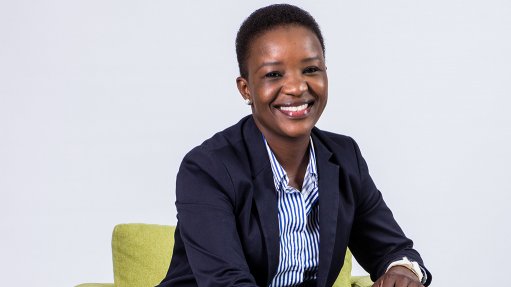
BLSA CEO Busi Mavuso
Business Leadership South Africa (BLSA) CEO Busi Mavuso has emphasised the important role the private sector has to play in the just energy transition in terms of investment in infrastructure for greener production.
“The opportunities are . . . abundant, stemming from the wider renewable energy supply chain, as well as electric vehicles (EVs) and hydrogen. The world’s eyes are on us, with chequebooks on the table.
“But we cannot take this for granted – we must develop a world-class transition plan. For once, financing it is not the main barrier – it is forming a clear vision of how we will achieve a transition and committing everyone to delivery,” Mavuso said in her July 11 weekly newsletter.
She was pleased with how thinking was advancing on how South Africa would finance the “massive” investment required for the energy transition towards a less carbon-intensive economy.
Mavuso said Presidential Climate Finance Task Team head Daniel Mminele had told the BLSA council a week prior that many countries were “keenly watching and hoping that South Africa would set a global precedent for how to engage international climate resources to support a just transition”.
At COP26, in Glasgow, Scotland, last year, the formation of the Just Energy Transition Partnership was announced. The governments of France, Germany, the UK, the US and the European Union collectively pledged $8.5-billion (about R130-billion) in finance for South Africa’s transition.
“That is a significant amount to help finance the transition, but it is going to take careful planning and engagement. There needs to be clarity on just where the investment would go – from decommissioning aging coal-powered electricity plants to financing new renewable generation and reskilling workers,” Mavuso said.
She said South Africa needed to have a plan ready ahead of COP27, which will be held in Egypt in November. The plan needs to be detailed and provide a clear path for the country to shift its carbon intensity in a way that protects those who are employed and otherwise rely on the current coal-fired energy generation system.
Mavuso said work on this plan was taking place under Mminele’s leadership.
In the first six months after COP26, the Climate Change Bill was tabled in Parliament, the hydrogen economy roadmap was drawn up and, through the Presidential Climate Commission, a Just Transition Framework was developed.
Mavuso said the investment plan prioritised the electricity sector, including decommissioning coal-based power stations, while supporting the communities affected. However, there were also plans for EVs and a green hydrogen industry.
“These provide exciting opportunities for the South African economy, given our production of many of the key metals needed for EVs and abundant renewable energy resources that could be tapped to competitively produce green hydrogen,” she said.
She added that business leaders needed to engage and determine how they could align their own planning with the wider transition.
“As BLSA, we will continue engaging with this work and supporting members in thinking through the consequences. The opportunity is there to grasp to ensure we become far more sustainable and become a leader in the world in managing a just transition,” Mavuso said.